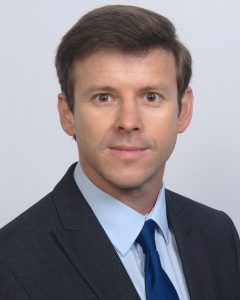Dr. Márcio Nunes is one of the newest members of the UF/IFAS Department of soil, water, and ecosystem sciences. He is an assistant professor of tropical soils who conducts his teaching and research at the Gainesville campus. We asked him a little about how his career has developed and what his future research goals are.
Can you tell us a little about your background?
I was born and raised on our family farm in Southern Brazil. There, I had lots of fun, worked hard alongside my parents, and learned about agriculture from a farmer’s perspective. My father is a passionate farmer, and I got this passion for agriculture from him. Since I was a little boy, I knew that agriculture would be my life. We still have our farm back in Brazil, so I am still a farmer!

To learn more about agriculture, I decided to attend college, and in 2012 I earned my bachelor’s degree in Agronomy from the Federal University of Pelotas (UFPel). I always liked research. As an undergraduate student, I was part of the CNPq Scientific Initiation Scholarship Program which aims at educating new researchers by including young talents in research projects. Under that program, I worked for 5 years in the Soils Department at UFPel. During those 5 years, I spent most of my time studying agronomy and working (having fun) with soils, developing field and lab experiments, and participating in extension and scientific events/meetings as a speaker or listener. In the end, I had no doubt I would like to be a soil scientist. Later, I earned an M.S. in Soils and Water Management from UFPel and a Ph.D. in Soils and Plant Nutrition from the University of Sao Paulo. Most of my M.S. and Ph.D. research were developed in collaboration with Embrapa.
I completed a portion of my Ph.D. research at Cornell University (2017 and 2018) with a focus on soil health and management. That work led me to a position at the USDA-Agricultural Research Service, where I developed research for 4 years. In 2022, I joined UF as a faculty.
Although I am still a young scientist, I already have a diverse and large background. First, I see agriculture as a farmer, agronomist, and scientist. This helps me to connect the research I develop in my Lab with real-life problems faced by farmers and society. Secondly, I have worked with several stakeholders, universities, industry, governmental agencies (e.g., USDA and EMBRAPA), and non-profit organizations (e.g., CIMMYT). Finally, I know both tropical and temperate soils and agriculture.
I am excited about my new position at UF. Here, I will be able to apply this diverse knowledge and experience to help solve and mitigate global problems such as food insecurity, human malnutrition, soil and water degradation, and climate change.
What led you to be a soil scientist, specifically one focused on tropical soils?
I have always been passionate about soil science. Since I was a child, my life has been around agriculture and soil. But passion is not the only reason I became a soil scientist. While working the soil as a farmer and later studying agronomy as an undergrad, I realized most of the biggest global challenges we face are linked to soils, especially soil health. So, I decided to focus my research on soils in order to help mitigate problems such as those I highlighted above (food insecurity, poverty, climate change, and natural resource depletion). Food production, buffering climate change, and protecting natural resources are linked to ecosystem functions supported by healthy soils. Most of my research has been centered around soil health.
A major portion of my research focuses on tropical soils for two main reasons. First, most of the big challenges are in the tropics. We need to improve human nutrition and mitigate climate and environmental degradation in the tropics. Secondly, because I am a tropical guy. Tropical soils/agriculture is in my blood. It is worth noting that I have also been developing research under temperate conditions, especially in the United States.
What is your vision for your teaching and research projects in IFAS?
My vision is to provide appropriate human nutrition to all people all over the world. I want to do this while mitigating climate change and preventing natural resource degradation.
I intend to achieve this ambitious goal by developing multi-disciplinary soil science research at local, national, and international levels to identify and secure the adoption of land management practices that sustain or enhance soil health. My research program will integrate students, especially those from developing nations where soil health challenges are often bigger and more complex than in the United States. I will dedicate a large portion of my research and teaching program to tropical agriculture, especially tropical soils. In fact, I have already begun several collaboration projects in the global south including my home country and countries from sub-Sahara Africa. Extension also will play a role in my program.
What do you foresee as being the biggest challenge ahead?
The critical biggest challenge facing humanity is to continue to increase food production while simultaneously reducing environmental impacts.
Poverty, hunger, malnutrition, and other human health issues continue to rise worldwide, especially in developing countries from the tropics. This reflects a combination of factors including a growing global population, economic slowdowns due to pandemics, climate change, and degradation of natural resources and their critical soil functions. Agricultural productivity has increased dramatically as we strive to meet increasing global demand for food, feed, fiber, and fuel, but has also contributed to climate change and natural resource degradation. Nevertheless, we still have a lot of research questions to answer. How can we sustain productivity increases without depleting our fragile soil and water resources? This is the largest question that we work around in my Lab. This is one thing that makes me get up every morning and come to work.
 0
0
